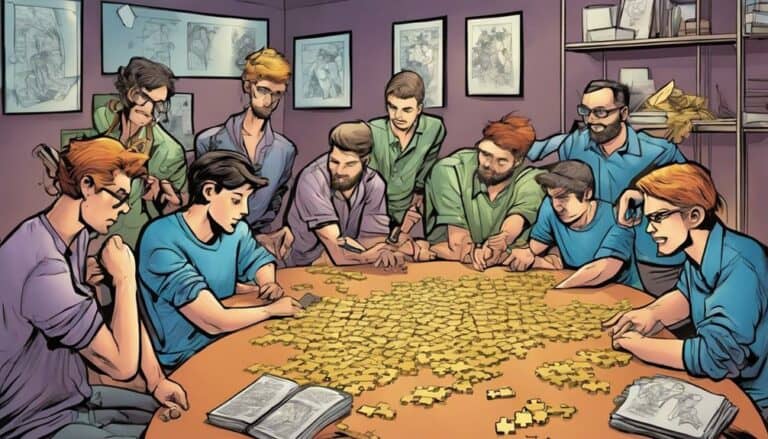When facing team challenges or conflicts, customizing team building games and challenges can be a strategic approach to foster resolution and enhance teamwork.
By tailoring activities to address specific issues within the team, you can create targeted solutions that promote a deeper understanding and collaboration among team members.
Curious to learn more about how these tailored approaches can effectively address your team's unique challenges and conflicts?
Key Takeaways
- Customize challenges to target specific team conflicts and challenges.
- Focus on enhancing communication, trust, and problem-solving skills.
- Utilize role-playing scenarios and tailored activities for conflict resolution.
- Address diverse perspectives and working styles to promote collaboration.
Identifying Team Challenges and Conflicts
To effectively address team challenges and conflicts, conducting team assessments is essential to pinpoint specific areas of discord and sources of friction. By analyzing communication patterns, role clarity, and personality dynamics, you can identify the root causes of conflicts within your team.
It's critical to gather feedback from team members to gain a thorough understanding of their perspectives on existing challenges. This feedback will provide valuable insights into the underlying issues that need to be addressed.
Utilizing conflict resolution models can offer structured approaches to resolving conflicts effectively. Tailoring team building games and activities to directly target the identified team challenges and conflicts is key to promoting collaboration and improving team dynamics.
Customizing Games for Conflict Resolution
Customizing games for conflict resolution involves tailoring activities to address specific team challenges and tensions identified through assessments and feedback. By customizing team building exercises, you can effectively improve communication, resolve conflicts, and enhance team dynamics.
Here are five key strategies to help you in this process:
- Incorporate role-playing scenarios: Use these scenarios to simulate real conflicts, allowing team members to practice resolution strategies in a safe environment.
- Emphasize active listening: Encourage team members to listen attentively to each other's perspectives to build trust and understanding.
- Focus on empathy: Foster empathy within the team to promote a deeper understanding of each other's viewpoints and feelings.
- Promote negotiation skills: Develop negotiation skills through collaborative activities to help team members find common ground and resolve conflicts effectively.
- Target diverse perspectives: Adapt games to accommodate various working styles and preferences within the team, promoting unity in conflict resolution efforts.
Tailoring Challenges to Team Dynamics
Tailoring team building challenges to address specific conflicts or challenges faced by a team requires a deep understanding of the root causes of these issues to effectively enhance team dynamics and performance. By customizing activities to target communication breakdowns, role ambiguity, or personality clashes, team leaders can encourage team members to work together more cohesively. These tailored challenges play an important role in improving conflict resolution, communication skills, and overall team bonding.
Team dynamics can greatly benefit from activities that focus on building trust, collaboration, and problem-solving skills. When team building games are aligned with the specific challenges present within a team, it provides a structured platform for members to address underlying issues and enhance their teamwork. Through these tailored challenges, team members can develop empathy, understanding, and a shared sense of purpose, ultimately leading to improved team dynamics and productivity.
It's essential to recognize the importance of addressing team dynamics through targeted activities to foster a more cohesive and effective team environment.
Addressing Communication Issues Through Activities
When addressing communication issues through activities, fostering active participation and engagement is key to enhancing team cohesion and understanding. Team-building activities play a vital role in improving communication within a team by providing opportunities for members to practice active listening, problem-solving, and coordination. Here are some ways these activities can address communication challenges effectively:
- '2 Truths and a Lie'**: Enhances active listening skills and understanding among team members.
- Role-playing scenarios: Boost conflict resolution skills and empathy by simulating challenging communication situations.
- 'Chain Reaction': Highlights the importance of clear communication and coordination in achieving common goals.
- 'Escape Room': Emphasizes teamwork and communication through collaborative problem-solving.
- 'Human Knot'**: Encourages communication, problem-solving, and teamwork, fostering better relationships and communication within the team.
Strategies for Conflict-Specific Team Building
To effectively address specific conflicts within a team, it's imperative to identify and tailor team building strategies that directly target the underlying issues hindering collaboration and productivity.
When building strategies for conflict-specific team building, focus on improving communication by creating a safe space for feedback where team members can address concerns openly.
Utilize role-playing exercises that simulate real team conflicts to help individuals understand different perspectives and develop effective resolution strategies.
Incorporating problem-solving activities that specifically address conflict triggers within the team can enhance problem-solving skills and foster a more cohesive work environment.
Additionally, using personality assessments can provide insights into individual preferences, allowing for better understanding and management of conflict situations.
Conclusion
To sum up, tailoring team building games and challenges to address specific conflicts within a team is a strategic and effective approach. By identifying challenges, customizing activities, and addressing communication issues, teams can enhance collaboration and overcome obstacles.
The alliterative strategy of aligning activities with team dynamics and conflicts enhances engagement and facilitates resolution. Customized challenges create cohesion, communication, and cooperation – vital components for successful team dynamics and conflict resolution.

